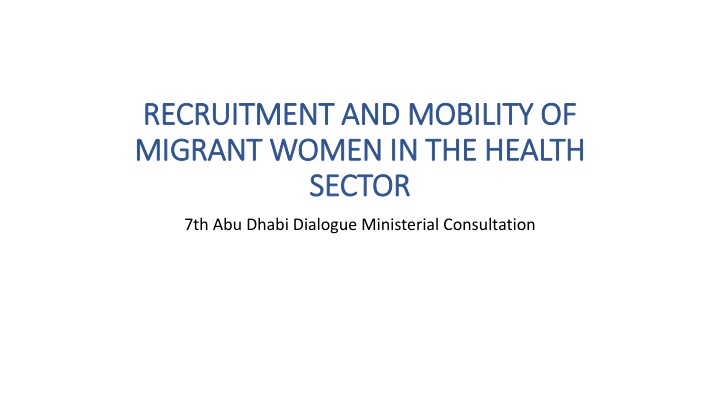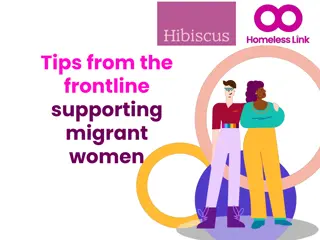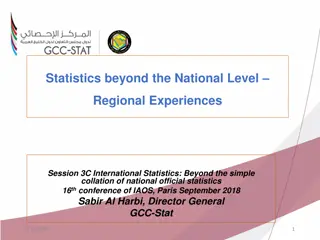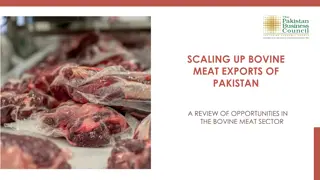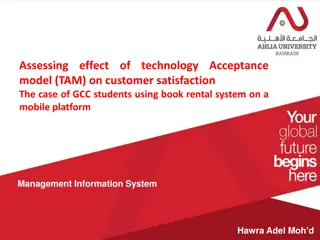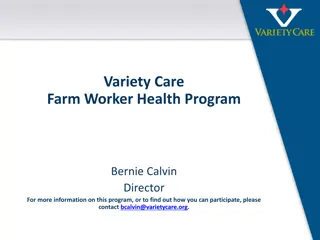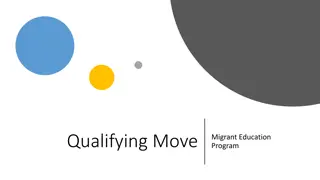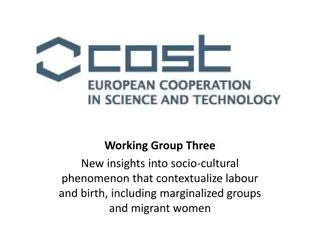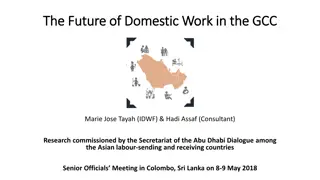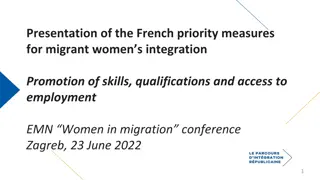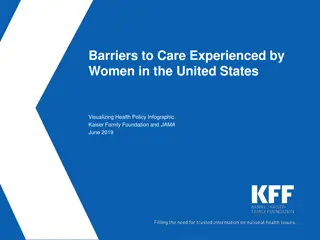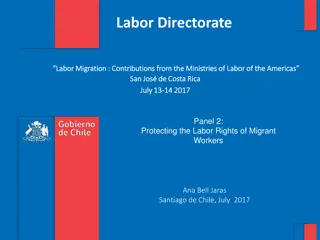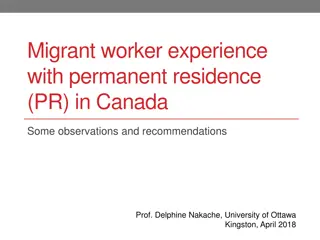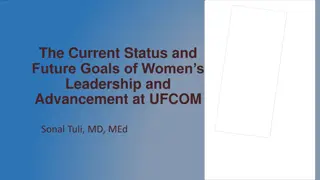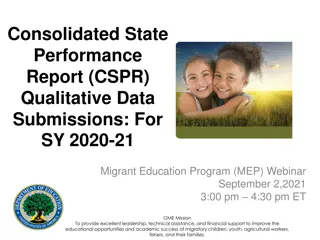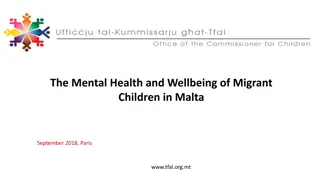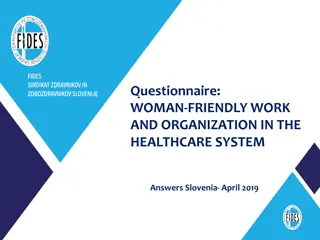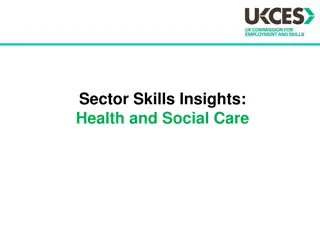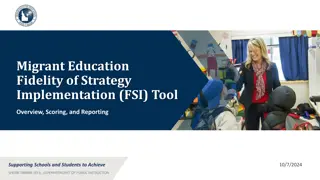Challenges and Opportunities for Migrant Women in the GCC Healthcare Sector
The recruitment and mobility of migrant women in the healthcare sector of Gulf Cooperation Council (GCC) countries present various factors influencing women migration. The demand for healthcare workers is rising significantly, with countries like the Philippines and Thailand contributing a substantial number. Push factors like high unemployment rates and pull factors such as renumeration opportunities play a significant role. The sector is expected to witness an increase in demand, with initiatives to optimize women's participation for better workforce management.
Download Presentation

Please find below an Image/Link to download the presentation.
The content on the website is provided AS IS for your information and personal use only. It may not be sold, licensed, or shared on other websites without obtaining consent from the author.If you encounter any issues during the download, it is possible that the publisher has removed the file from their server.
You are allowed to download the files provided on this website for personal or commercial use, subject to the condition that they are used lawfully. All files are the property of their respective owners.
The content on the website is provided AS IS for your information and personal use only. It may not be sold, licensed, or shared on other websites without obtaining consent from the author.
E N D
Presentation Transcript
RECRUITMENT AND MOBILITY OF RECRUITMENT AND MOBILITY OF MIGRANT WOMEN IN THE HEALTH MIGRANT WOMEN IN THE HEALTH SECTOR SECTOR 7th Abu Dhabi Dialogue Ministerial Consultation
Methodology Methodology Countries of Destination (CoD) Countries of Origin (CoO) Bahrain Kuwait Oman Qatar UAE The Philippines Thailand Desk review and semi-structured interviews with government officials CoD Government stakeholders: Public Authority of Manpower in Kuwait Ministry of Human Resources and Emiratization in UAE Ministry of Labour in Bahrain, Qatar and Oman. CoO Government stakeholder: Ministry of Health in the Philippines Ministry of Public Health and Oversees Employment Administration, Department of Employment in Thailand.
Role of Women Migrant Workers in GCC Role of Women Migrant Workers in GCC Health Workforce Health Workforce Demand of healthcare workers is expected to rise by 240% in the next two decades Expatriates in GCC health workforce: Physicians: 75% Nurses: 79% The Philippines Thailand In 2021 the Philippines contributed 316,000 healthcare professionals to the world. 41% of which are nurses working in 2018-2023 (Number of healthcare professionals) most significant number to Kuwait (less than 100) 41% of which are nurses working in Saudi Arabia Saudi Arabia
Factors Influencing Women Migration in Factors Influencing Women Migration in Healthcare Sector Healthcare Sector Push Factors Pull Factors High unemployment rates Shortages and active recruitment from high-income countries Low wages Economic downturns Broader management and governance issues Renumeration and employment opportunities Policymaking needs to address salary differentials, employment opportunities and professional development to mitigate push factors
Increasing Demand in GCC Healthcare Industry Increasing Demand in GCC Healthcare Industry Gulf Healthcare sector 2020 86.2 Billion 2023 99.6 Billion Saudi Arabia and UAE hold 80% of the total healthcare spending in the GCC. UAE will be requiring 33,000 nurses by 2030. Optimizing participation of women healthcare professionals: Prohibition of retaining workers passports Wage protection Improved employer change accessibility WHO Code of Practice
Recruitment Codes and Practices Recruitment Codes and Practices EU, Asia EU, Asia Countries of Destination UK s approach Regular auditing of recruitment agencies UK s MoA with the Philippines and Kenya UK India Framework Agreement for Collaboration on health Care Workforce. Germany s adoption of the WHO Code of Practice BLA with the Philippines on ethical recruitment Recommendations: Strengthening capacities in source countries Incentivizing return and circular migration Fostering continuous dialogue for ethical practices Countries of Origin Set of legal terms and practices for the protection of migrant workers: The Philippines: Regulatory framework governing recruitment agencies Emphasizing protection against illegal recruitment and exploitation The Migrant Workers and Overseas Filipinos Act, or Republic Act 8042 of 1995
Recruitment Codes and Practices Recruitment Codes and Practices GCC GCC Countries of Destination Countries of Origin Only Bahrain has a Memorandum of Agreement (MOA) with the Philippines specifically related to the healthcare sector. For healthcare professionals from the Philippines clinical experience and actual preparation are prerequisites before traveling overseas. Only Bahrain and Qatar are working with several countries of origin governments to develop shared training programs for migrant health professionals before arrival The healthcare professionals from the Philippines undergo both origin-based and host-country-based training to upskill healthcare professionals. Oman, KSA and UAE MOH are focusing on training and upskilling in CoD organizing and designing specialized focused training sessions for healthcare professionals after arrival . Generally, nurses, doctors, and other HSMs tend to undergo a unified internationally recognized certification standard No specific training programs in Kuwait for healthcare professionals. However, the PAM is in the process of considering and developing online medical training sessions for incoming healthcare professionals before their arrival in Kuwait.
Good Practices Good Practices Legal and Policy Frameworks ADD corridors between GCC and the Philippines and Thailand MoA between Bahrain and the Philippines in Healthcare Bilateral and multilateral Labour Agreements The ASEAN multilateral agreements UK Agreements with India, South Africa and the Philippines BLA between UK and Kenya on healthcare workforce collaboration Enhancing Ethical Recruitment in the Health Sector Establish regulations for governments and recruitment agencies and ensure they adhere to ethical standards
Good Practices Good Practices Cont Cont Retention and mobility in the health sector GCC conditionally extends long-term legal residency rights Offer access to healthcare and social protection Ensure maternity cover for women migrant health workers Training and upskilling Invest in public sector training opportunities Public Private Partnerships Aimed at channeling investment also in private sector health care Kaigoryugaku: A Pathway for Skilled Care Workers in Japan Transfer of good practices between public and private sectors Language/ cultural trainings and peer-coaching The Triple-Win Project
Good Practices Good Practices Cont Cont Skills Mobility Partnerships (SMPs) Providing training and upskilling opportunities not only for those who migrate and in the CoO, creating a pool of talents Expanding knowledge, leading to better career prospects, talent retention.. Components of SMPs 1. Formalized State Cooperation 2. Multi-stakeholder involvement 3. Training 4. Skills recognition 5. Migration/ Mobility
A f A few r ew recommendations ecommendations GCC secretariat to undertake a mapping of the admission conditions and rights of healthcare workers from 3rd countries in GCC MS. BLAs to make specific reference to women recognizing their challenges Promoting and reviewing Codes of Practice for International Recruitment of health care workers Create a common qualification framework between CoO and CoD Consider co-investing in skills development in CoO for the purpose of creating a pool for skilled health workforce for home and the away track Advanced post-arrival training for migrant health workers both men and women Labour laws enforcing the provisions for fair wages, safe working conditions, access to healthcare and promote gender equality Promote diversity and inclusion by providing equal opportunities for career advancement and professional development
Thank You! Thank You!
